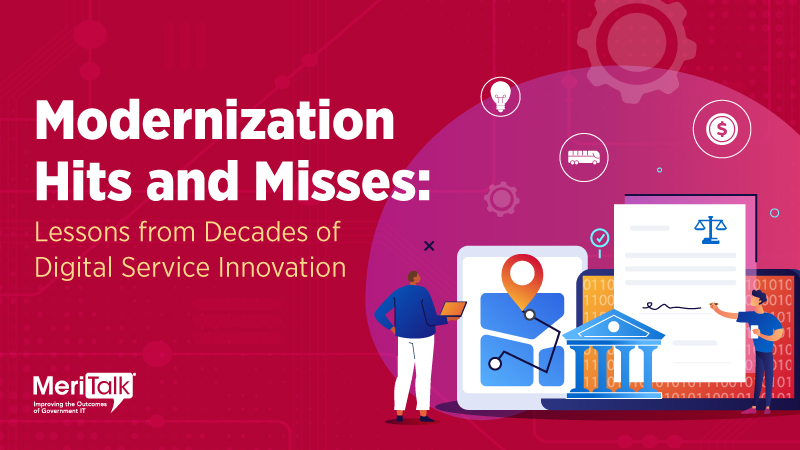
Federal IT leaders are championing citizen service priorities from the President’s Management Agenda (PMA), but legacy technology continues to hold citizen services back, according to new research from MeriTalk.
For the “Modernization Hits and Misses: Lessons from Federal Digital Service Innovation” report, MeriTalk surveyed 100 Federal IT decision-makers to discover the impact of IT modernization on citizen service outcomes, lessons learned from modernization initiatives, and best practices for delivering excellent, equitable, and secure citizen services.
The survey found that the PMA is making a real impact in Federal agencies, as the majority – 87 percent – of Federal IT leaders said their agency has made interacting with the government easier in the past year.
The progress is promising, with a whopping 99 percent of respondents who said that IT modernization efforts have changed the citizen experience.
According to respondents, the most impactful modernization efforts include implementing cloud computing, refining data management and protection strategies, improving analytics and data-based decision-making, and investing in emerging technologies.
However, despite this progress, legacy technology continues to hold citizen services back.
Federal IT leaders said reliance on – or integration with – legacy technology is the number one factor in failed citizen service initiatives.
Reliance on outdated systems limits Federal agencies’ abilities to offer modern citizen services and make real-time data-driven decisions. Additionally, it prevents agencies from delivering the user-friendly digital services that citizens demand.
When asked about their modernization projects that led to the most positive outcomes for citizens, respondents said the availability of modern technology was the number one factor that had the biggest impact on their success. Other key factors were clearly defined citizen service goals and objectives, as well as a fully planned roadmap before starting.
Feds are looking to a variety of IT modernization investments that will make a significant positive impact on the citizen experience.
One respondent said they “simplified and optimized the existing IT infrastructure [to operate] securely in a hybrid environment,” whereas another respondent introduced AI, “which, in a lot of ways, made work easier and made customer service faster,” they said.
Going forward, 59 percent of respondents agreed that 5G will have a significant impact on the pace of Federal modernization over the next five years. Respondents said other impactful technological advancements include high-performance computing (52 percent), cloud computing (52 percent), artificial intelligence/machine learning (48 percent), and edge computing (47 percent).
To learn more about impactful digital service initiatives and citizen service recommendations for Federal IT leaders, be sure to check out the complete report.
